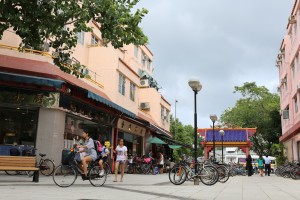Opinion among the Chung Ying Street retailers is mixed.
Fifty-year-old Leung Kai-chung, who is a second generation store owner, agrees with the proposal. He says opening up would lead to development and progress and says it is essential for areas like Chung Ying Street to divert mainland shoppers away from crowded areas like Causeway Bay and Sheung Shui. Once they have bought their fill of Hong Kong products, they will just leave and go home, he says.
However, Lau Wan-ying, a newspaper vendor and local resident is worried about the implications for security. She says Sha Tau Kok is an extremely safe place. Most residents are elderly people who lead simple lives and it is easy to spot strangers because residents recognise each other.
Lau is satisfied with her lot, “I don’t need to employ staff and I just need to make money to pay the rent, that’s all.” But she thinks the rent would definitely go up and public security deteriorate if the area is opened up.
“Local residents normally disagree with the opening of Sha Tau Kok, except those who own their own land,” she says.

Ms Law who owns a children’s clothing boutique in Chung Ying Street says Hongkongers spend less than Mainlanders do. Nearly 80 percent of her customers come from the Mainland. She guesses Hong Kong people are uncertain about the quality of goods at Chung Ying Street.
Yet Law signed the petition against opening up Sha Tau Kok. She hopes Chung Ying Street can retain its unique atmosphere which depends on the fact that people cannot easily access it without closed-area permits. She argues that the permit-only rule might continue to prompt people’s curiosity so that they treat it as a tourism spot when they travel across from Shenzhen.
Despite public discussion, the Development Bureau says it has no immediate plans to develop Sha Tau Kok district and that Chung Ying Street is unsuitable for large-scale development due to its restricted access. In a written reply, the Security Bureau said there was no plan to establish a control point at Chung Ying Street at present because it “involves various complicated considerations”, such as immigration, residents’ mobility and boundary security.
As for the younger generation of Sha Tau Kok, they have different thoughts about their home.
Chan Sai-leong, a university research assistant who used to live in Nam Chung, which is a few kilometers away from the Sha Tau Kok town center, says he does not miss the desolate environment and inconvenient transportation.
Although the 22-year-old has moved to the city, he is happy to see more commercial activities taking place in his old neighbourhood. Chan believes development and conservation should co-exist. He thinks others who live in more developed districts have no rights to ask Sha Tau Kok residents to preserve the area, while they themselves are enjoying the benefits of development. Chan says. “This is totally unfair. Why is it that you can develop yours but we cannot develop ours?”
Chan understands that a coin has two sides. The opening of Sha Tau Kok could result in the emergence of parallel traders who might cause disturbance to the district. Yet, he is convinced that if the government compensated the shop owners and the residents reasonably, there would be no complaints.
But to 21-year-old Raymond Wong Wai-nung, a local resident who works as an investment adviser, the development project could be another way to enrich the already rich and powerful at the expense of the livelihood of local residents. He agrees the opening up of the area would only turn Sha Tau Kok into a centre for parallel traders. “Such a proposal wraps itself in ‘development’ and ‘business’, exploiting the livelihood of normal residents. They fall victim to it completely,” Wong says.
Wong believes opening up is essential to generate income, but he hopes that any plan would be beneficial to all parties involved. “You need to think twice, do we need to trade what we originally have for such business opportunities?” he asks.
Edited by Cherry Wong






































